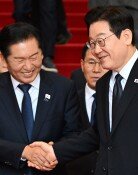Oil Barrel is Looters` Most Favorite
Oil Barrel is Looters` Most Favorite
Posted April. 21, 2003 22:08,
This is a gas station located on the street of Karade Dakul, the former central region of Baghdad in the eastside of the Tigris River. There are three rows of extremely old sedans, the line reaching as long as 50 meters per row are lined up at the station. The passenger and the back seats are crowded with empty oil barrels. The line for the gas is slowly moving just about 5 meters in 15 minutes.
The price of oil is 15 Iraqi Dinar per liter. The price has not been increased much since the war started but the quantity is in shortage compare to the demand. The other gas stations have been closed down. Thus, the fully filled up tank barrel takes the first place in the looter`s list.
How can Iraq suffer from the shortage of gasoline when Iraqi ranks the second in the world, after Saudi Arabia, proudly having 130 billion barrels of petroleum buried under their land? “Saddam Hussein has run away in woman`s attire. We`re suffering because of him,” an elder stated strongly on his way out after filling up his 25 liter barrel with petroleum.
The petroleum raised the quality of the average living but at the same time, it blocked the maturation of the citizens. The royal families along with the authorities monopolized the revenue from the petroleum sales thus stabilized their organizations by giving benefits to their friends and partners only.
Hussein also used the rapidly increased petroleum revenue after 1970 to progressively increase the number of public workers from 20,000 people in 1958 to 580,000 people in 1977 and to 820,000 people in 1991. This bureaucracy had been a strong foundation for Hussein along with the military organizations such as the Republic Guard. There is a report saying that the among the world`s oil producing countries, Norway is the only democratized society and that is possible because the country had formed and maintained a democratic society before the discovery of the petroleum fields.
The administrative building of the Ministry of Internal Affairs located on the Al Kulapa Street of Baghdad was on fire on April 18. “It is highly likely that the U.S Army set the fire,” stated a spectator, Ahmed Ala (27 years of age). When he was asked the reason for such a statement, he confidently replied, “if the building is destructed, an American company can move to reconstruct it.”
The coalition forces have destroyed the general governmental offices in Baghdad with missiles. However, the governmental office of the oil department has surprisingly survived the thousands and thousands of the missile attacks, thus the citizens believe that the U.S. Army has been the first to seize it.
Likewise, the Iraqi are very suspicious of the United States` true `intention of the war.` They welcome the driving away of Saddam Hussein but they think that the United States would have not started the war just for driving out him.
The unfortunate relation between Iraq and the United States goes far back to 1963 when the United States first supported in the rear during the time of Hussein and the Baath Party momentarily taking over the power in Iraq. When General Abdul Kaseem started the coup d`etat saying that “Iraq overly yields to the colonial suzerain country of England in the petroleum sales,” the United States supported Hussein in consideration to prevent the Iraqi Petroleum Company (IPC) becoming nationalized. Despite the support Hussein got from the United States, he backstabbed the U.S. by nationalizing the IPC when he permanently seized the power in 1972.
Since then, Hussein had poured the half of the petroleum revenue in the expansion of the military and police forces to build up its national security to the point of threatening the other surrounding countries. This stimulated the United States and gave the justice of the war, `the Elimination of the Weapon of Mass Murder (WMD)`.
The economy of Iraq just depends on the exports of coconuts and wool besides the export of petroleum which reaches 2.3 ~ 2.4 million barrels per day. Right now, the interest of the Iraqis is focused on how the distribution of the oil revenue will be determined`. Prior to the war, Iraq took the rest of the revenue from the total petroleum export sales after deducting 41% totaling the *indemnities of war, *reconstruction cost for the Kurdistan and *the administration cost to the United Nations.
There is no doubt that the United States` plan to use the revenue from the oil sales on the war cost and the peace maintenance fee would cause a great resistance from the Iraqis. In the Pirudus Squre next to the Sheraton Hotel where the reporters are staying, the placards reading, `Iraqi Oil to the Iraqis`, and the shouting are very uproarious.
The Iraqi economy which proudly boasted of being the strongest country in the Middle East until the beginning of the 1980s now has lost its foundation due to the war with Iran for over 8 years as well as the UN`s management of the embargo on the exportation after the Gulf War. It seems like President George W. Bush of the United States optimistically views the national reconstruction process similar to the beginnings of the seizures of the power of Mao Tsedong of China, Lenin of former Soviet Union, and Chief Kadapi of Libya.
However, the citizens of Baghdad met by the reporters have voiced out that “the United States must return after the order in Iraq has been established.” Is establishing a pro-America government the best answer to this? It seems like it wouldn`t be a benefit either to the Iraqis as well as to the long-term goal of the United States.
Rae-Jeong Park Sung-Kyu Kim ecopark@donga.com kimsk@donga.com







